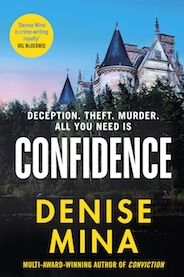Confidence is about the phenomenon of citizen detectives and about faith and proof. Anna and Fin set off to try and find a missing girl who has discovered a silver casket that may or may not have belonged to Pontius Pilate. The girl vanishes from her front hall and the box is suddenly up for sale in a Paris auction.
 It’s a crime novel that uses social media as the B story: that second thread that informs and impacts on the A story and its characters. Having used the podcast convention in Conviction I was super-keen to get back and use a lot of the developments I’d witnessed since the first Anna and Fin book about a true crime podcast came out.
It’s a crime novel that uses social media as the B story: that second thread that informs and impacts on the A story and its characters. Having used the podcast convention in Conviction I was super-keen to get back and use a lot of the developments I’d witnessed since the first Anna and Fin book about a true crime podcast came out.
I was unsuccessfully trying to write something else. There are times for getting up from the desk and walking away, going off to do some admin or cleaning or phone calls, but there’s often a time lag between knowing this and actually getting up. It can take hours of silent self-admonishment and mucking about with pens and links.
Anyway, I think I was looking for holidays I couldn’t afford when I found myself on YouTube watching a very odd film. A young man was speaking into the camera as if he was with a film crew and telling us, the viewer, that he planned the break into that building over there and show us what he found. He had heard a lot about it. The family who lived there had five children and a gran living with them but one day they just grabbed their coats and left and that was eight years ago and no one knew why. ‘THEY LEFT EVERYTHING’ said the subtitle to the film.
I was intrigued. I couldn’t understand why he would film himself committing an offence like that, or work out why the family had left.
If the pending question is what drives a novel then this film had it all.
I’ve often thought about the convention of the dead body as the engine of crime fiction. Nowadays it’s the main motif but it wasn’t always, missing heirlooms and jewels used to be peril enough but the vast majority of detective fiction now relies on that finding of the corpse to fuel the next three hundred and fifty pages. What a pity it is to leave all these other hanging questions to cozy crime fiction because families behaving irrationally, objects being stolen, questions of faith, odd young men with strange hobbies, all of these are so much more familiar to most of us than the finding of a murder victim.
Another story that inspired the book was the Gabby Petito disappearance. Gabby had packed up a small van and gone travelling with her boyfriend when she disappeared. Her boyfriend returned to his family and refused to talk about what had happened to her but then the internet got interested. A posse of citizen detectives, brainy people who trawl the internet looking for evidence, had gone back through dash cam footage of the same journey and found images of the van parked in a suspicious area. Then footage emerged of Gabby and her boyfriend being stopped by the police and interviewed about an eye witness saying he had been hitting Gabby on the roadside. Gabby was crying and apologising. The boyfriend took the cops aside and explained that she was nuts. Because of these discoveries Gabby’s body was found and the boyfriend went on the run.
She might never have been found but for the involvement of those citizen detectives. They solved the case.
It’s intimidating for us crime writers to try and keep up with tech developments. I think mobiles have ruined a lot of the old conventions like chase scenes or disappearances, but I like to embrace them, even if they will change almost before the book comes out. They put the story in the present day, they make it seem real and credible to a reader like me.
The faith element seemed like the only thing to write about in the present moment. I grew up in a very Catholic family but am not religious myself. I’m always struck by the comfort faith must give people, I’m a little jealous, but understand that it isn’t all comfortable for people of faith. They not only have to grapple with doubt but the real terror is proof. And faith is everywhere: watching Trump supporters witness the January 6th hearings, seeing Ivanka Trump admit that the election wasn’t stolen, they would rather doubt the entire electoral system and the press than question their faith.
In many ways publishing a novel is always an act of faith, a belief in the future reader unseen, untouched, unknown. It’s pure faith in the need for stories.

Confidence by Denise Mina is published by Harvill Secker on 7 July 2022.
SHOTS' Gwen Moffat begins her review with:
Disappearances are always intriguing and Mina is a skilful writer; to start her latest novel with a disappearance is a hook, for that hook to take the form of a dull review of an amateur film is irresistible. This is an author who signals a clear field before you step on a mine.
Read the whole review here